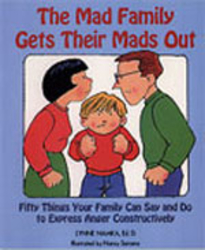Parents Get Mad Too!
Author: Lynne Namka, Ed. D.
Remember, anger as an emotion is normal human behavior. As a response, you have choices. Choose from the productive expressions of anger. Tell yourself … “It’s OK to be angry. I choose to use my anger constructively.” Anger can be a signal that something in your life needs changing. When your personal resources are exhausted, you are more likely to be angry. Plan alternative fun things for your child to do when you are fatigued or ill.
Check your own stomach, fists, and jaw. Observe how your body starts to tense up and react automatically when you feel threat. Know when you are mad! Analyze your own patterns of responding to anger; know what your typical anger response is. Watch yourself as the heat starts to rise. Observing yourself may help break into your regular anger response. Break into your regular response pattern. Remember to breathe.
Bite your tongue when the angry words start to arise. Gently, of course, to remind yourself to inhibit your angry verbal or striking-out response.
Breathe deeply, then state your anger in a firm voice, “I feel angry, when you____.” Make this formula a habit in your family by your using it often. If you have problems saying it, practice on the dog or the mirror at first.
Distract yourself for a short time before going into problem solving by:
- Reciting the days of the week, months of the year or counting to ten in a foreign language.
- Phone Dial a Joke, The Weather, the Daily Prayer or Time.
- Take a walk or weed the garden
- Displace your anger by cleaning the house. Vacuum while you cool down.
- Do a self-soothing exercise. Massage your arms and neck. Hug yourself. Take a warm bath. Smell a flower. Pet an animal. Hug a Teddy bear. As the National Committee for Prevention of Child Abuse says, “Take time out. Don’t take it out on your kid!” Know it’s okay to be angry.
Bypass a negative anger reaction by going directly into problem solving. Don’t try to fix blame. Determine what is needed to correct the situation. Contribute to the solution, not the problem.
Call Parents Anonymous or a sympathetic friend. Make sure your child realizes you are reaching out for help in anger reduction not calling someone to blame him or her.
If you continue to get angry at your child, seek professional help or take a parent training group. Whatever the cost, it is a bargain in providing stress reduction in your household. Short term therapy often offers techniques to insure good mental health for you and your child. The amount of money and time you use in learning practical tools of communication and discipline are an investment in your child’s future.
|
 |